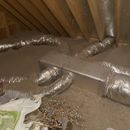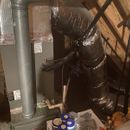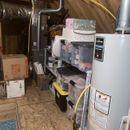ERV/dehumdifier retrofit
Hi everyone, I know there has been quite a bit of discussion on mechanicals and attics, but I still find myself a little lost. Here’s the predicament:
My brother, living in climate zone 4A (Virginia Beach), has 2015 built home with large unconditioned attic containing air-handler, HWH, and lots of insulated flex-ducting (it’s a large home, about 3500 sf). The attic floor has roughly 12″ of blown in cellulose. I’m confident there’s no air-sealing in the home or attic, as he’s spending about $350 per month in the summer to keep the home cool. My guess is he can either air-seal the attic floor with closed cell, beef up the insulation and bury his ducts, OR, air seal the roof sheathing and then insulate with the cavities with batts (2×6’s) and possibly some rigid foam beneath the rafters. The former solution being much cheaper. (also considered replacing gas HWH with heat-pump and putting the equipment in the laundry room below, I saw an article on GBA about this not too long ago)
So far so good? Please comment if I’m missing something here.
Where I really get confused is with whole-house dehumidifiers or ERVs.
-Is an ERV worthwhile if the home is not air-sealed?
-Will either of these cause the massive AC units to short-circuit?
-Is either one worthwhile here? If so, which would be the first choice?
-I’ve seen some ultra-air retrofits online that didn’t seem too cumbersome.
-I guess the overarching question is, what’s the best step for a more efficient/comfortable home after air-sealing? And at what point do we absolutely need an ERV to help ventilate the home once it’s been sealed pretty well?
Let’s say we’re working with a 3-4k budget. Pictures attached
**I think a lot of people often find themselves in a similar situation, as far as house layout goes. Can we come up with some type of decision matrix for different options and budgets? That would be awesome. Anybody know of one?
GBA Detail Library
A collection of one thousand construction details organized by climate and house part














Replies
I'll take a stab at a few of these:
-Is an ERV worthwhile if the home is not air-sealed?
Only if you have an air quality problem already (that can't be fixed by source control).
-Will either of these cause the massive AC units to short-circuit?
No. An ERV will actually add load to the system unless it replaces and existing non-ERV vent system. A dehumidifier converts latent load into sensible load, also adding a load that didn't exist before. AC would run a bit more in both cases.
-And at what point do we absolutely need an ERV to help ventilate the home once it’s been sealed pretty well?
Roughly 3-5 ach50 is where you need to add mechanical ventilation, but it varies from building to building. You may also need a dehumidifier, depending on how appropriate the sizing of the AC system is. Too far oversized (indicated by short cycling) often leads to high humidity. Ideally the AC is replaced with a smaller one, but a dehumidifier would help make up for it - and may necessary anyway in your fairly humid climate.
> Roughly 3-5 ach50 ... it varies from building to building
Take the case of a closed door bedroom with two people on an average night (will be far worse on calm, mild nights). Say 5 ach50 and a N-factor of 20, so .25 ACH. So say 7.5 CFM for the bedroom, far short of the 30 CFM needed for healthy sleep.
Summary: closed door bedrooms almost always need active ventilation.
Thanks everyone, what a great community! I will continue to learn and hopefully one day contribute on here.
Tim